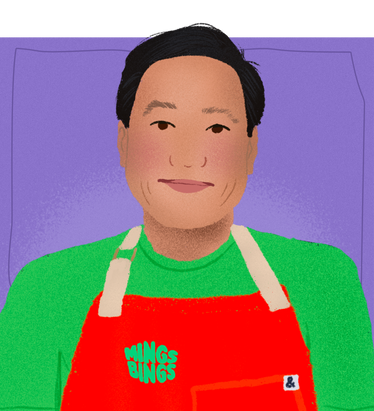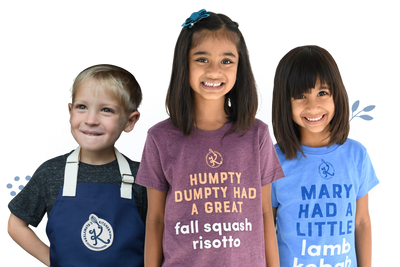
Taste Bud Profile
Ming Tsai

Chef Ming’s lifetime obsession with food is generational—his parents, extended family and kids all share in his enthusiasm. From dumpling assembly parties to driving hundreds of miles out of the way for the best dim sum, Chef Ming thinks that experiences around food are meant to be savored, celebrated, and shared. Read on for ways that the celebrated Iron Chef, entrepreneur, and proud dad teaches respect, responsibility, and joy through food.



Ming Tsai: “I was, I am, and I always will be, obsessed with food. When I was old enough to stand up, about 2 years old, I started hanging out in the kitchen. It was the coolest place to be. There were sights and sounds and fire and noise and of course—delicious things cooking. My parents and grandparents would usually let me taste whatever they were making, so I learned early on to hang out in the kitchen and I’d never be hungry. As soon as you were big enough to sit at the table in my family, you were old enough to be involved in the process. Dumpling days were my favorite, and they’re my kids’ favorite when they were growing up too. The same hot water dough you use to make dumplings is also used for scallion pancakes, so dumpling day was extra great because we got both. We’d invite a couple of Chinese families over for dumpling parties, which basically meant that my house was the Chinatown of Dayton, Ohio—there were not a lot of Chinese families there—and we’d sit and make them around the ping pong table. We’re talking about hundreds of dumplings here. A couple hours later, with some scallion pancakes in between, we’d then eat hundreds of dumplings. Those dumpling-making days are some of the fondest memories I have from growing up.

I’ve always had a sense of pride and a sense of community around my culture. I am very proudly Chinese American—I love China, Chinese culture, the food, and the people. It can be such a conflicting love, because of course I do not condone so much of what the government does to oppress women and people of other races among so many other hateful things, but I will never not be proud of my culture and Chinese heritage. We did not have a large Chinese community in Dayton, but my family has always celebrated our culture. For me, my formative sense of community came from our gathering around the dinner table. We gathered as a family every day at 5:30 and discussed everything—our grades, sports, all the good, all the bad. It was such a foundational element of my life. I always had a roof over my head, and I always had food. My family being the most important thing in my life provided a constant.
It wasn’t until I went to college that I really understood that it wasn’t the same for every kid growing up. Our entire social fabric was based on being together, and then around food. It was unfathomable to me that people didn’t all sit with their families, or even have two parents, or cook, or talk about food. I couldn’t imagine what we’d talk about if we didn’t talk about food.
We were all obsessed. We’d be in Dayton, driving from point A to point B—but point C was Chinatown in Toronto, 300 miles away. We’d drive 300 miles out of the way to pick up pink boxes of dim sum.
That’s just how I was brought up, and that’s how I am now with my kids, who are as food obsessed as I am, and as my parents were. There’s not a damn thing in the world we do without food, and I’m super grateful that I had those experiences and can now share them with my kids.

I cooked on my own for the first time when I was 10 years old. Back then, the place I grew up was the kind of place where nobody locked their doors and kids were safe home alone. A Caucasian couple showed up to the door—I didn’t really know them, but I recognized them from the neighborhood. Everyone was just “uncle” or “aunty” to me. Nobody else was home, but I knew they were friends of the family, so I did what we always did when people came to the door.
In Chinese culture, you don’t say “ni hao ma (你好吗)” which is “how are you”, You say, “chi le ma? (吃了吗),” which is “have you eaten”?
When you see people, you want to know if there’s an opportunity to share food together. So I asked if they were hungry, and they said yes. So I offered to make them fried rice. I had never made fried rice before. But I had the confidence of a 10 year old boy, and some training. I had basic knife skills, and had watched my parents and grandparents make fried rice probably hundreds of times, so I figured—how hard could this really be? Like any good Chinese household, we always had leftover rice, ginger, garlic, scallions, and eggs. So I did the eggs first, set them aside, chopped everything else in there and cooked it. Honestly, it was like a 6 out of 10 for quality—a little too much oil because I didn’t want the eggs to stick, a little too much soy sauce because I was 10—but I made it! And they ate it, and then… they smiled. I suddenly had this realization: I could make people happy through food. This was really cool. I could make my friends, family, even complete strangers smile just by making something delicious for them. Food can be more than sustenance—food can change the world. People like José Andrés, through his charity World Central Kitchen, prove that on a huge scale every day. He’s literally feeding, and therefore changing, the world. That’s the power of food. I’m grateful every day that I’m a chef. It’s by far the best job in the world for me, making people happy through something that I love so much.
Artists have this ability too—you listen to a song, you see something beautiful, it makes you happy. But food is the only thing that you need that can also do this.
It’s the only thing you smell, taste, touch, experience with all of your senses, and it actually goes inside you physically. Food makes us happy, but it also keeps us alive. I’m not sure that music and Matisse can.
I think it’s important to cook with your kids, or at least get them involved in the process. The scallion pancake is the best thing to start with. Anyone can do it. It’s just hot water and flour to make a dough, you roll it out, you put it in oil with scallions and salt. It’s fun, it’s easy, it’s delicious. One thing kids really seem to pick up on after they help cook something is that they don’t want to waste any food. They realize that it took effort, and they put in effort, and they don’t want to just let it go after that.

I think they also start to realize just how much it takes to put food in front of them, and that you can’t just assume food will appear on the table for you just because you’re a child. In my house growing up, we were all part of everything. We all had our duties. If you weren’t helping to cook, you were helping to clean. It’s the same in my house now. You have to contribute, you have to appreciate the work that goes into making your life what it is. I always took my kids grocery shopping, to fish markets, orchards, farms, everywhere. I wanted them to see where food comes from, and to really understand even from a young age how much effort it takes to get any ingredient, even something as commonplace as an apple, to your table. To me, this is about respect. Another thing that is special about involving your kids in the process is the opportunity to preserve culture. With the scallion pancakes, for example,I taught them what my grandparents taught me, and what theirs taught them. Food is meaningful and spans generations. It’s the same for someone who learns to make empanadas or pierogies with a family member. They’re preserving culture and a way of life that has been around forever. Dumplings have been around for centuries! To me it’s special to be reminded that we can share these things with our ancestors and with our future generations. We have every device and contraption available to us now and a dumpling is still a dumpling. Culture is here forever. It can modernize, it can adapt, but the things that last have lasted because we respected those aspects of our culture and history."

